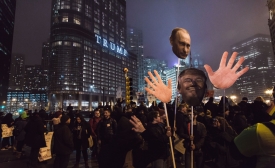geopolitics
“Vision 2030” shows that Saudi Arabia is conscious about the necessity to reform the country’s economy. Its cut in social spending, the plan to introduce a tax on expenses by 2018, and –more importantly- its plan to privatise the state oil company Saudi Aramco are very positive. [...] The success of Saudi Arabia’s economic reforms is crucial to the West, who needs a stable Saudi Arabia in an already chaotic Middle East.
A hard-line strategy is not likely to persuade the DPRK regime to give up its missiles and nuclear weapons. Nor will it garner the support of the South Korean public, which is poised to elect a centrist or center-left president in the May 9 election. Most importantly, preemptive strikes or enhanced sanctions will delay ongoing economic reforms in North Korea and set back its integration into the global economy. Internal economic and social change is ultimately the only path to moderate the DPRK regime and its policies.
Facing an uncertain geopolitical climate, Japan and India will benefit from working closely to play a greater leadership role in the region as they share converging strategic and security interests. Given the possibility that the United States may disengage from the Asia-Pacific, both Tokyo and New Delhi are concerned about Beijing’s increasing assertiveness and will seek to increase their collective capabilities to counterbalance China’s otherwise unhindered dominance.
As the Association of Southeast Asian Nations celebrates its 50th anniversary, the complexity of the internal and external environment is severely testing its approach to cooperative security that rests, above all, on preserving the sovereignty of each of the 10 member states.
While designing an effective corporate diplomacy strategy, companies must develop in the most ethical way their own approach or stance to foreign governments, rather than manipulate or be manipulated by the policies of their home country. [...] Geopolitical volatility is no different from other forms of volatility. As long as a company's geopolitical assessment processes are comprehensive and its corporate foreign policy perceptive, business leaders will be able to navigate all challenging times.
All in all, Salman’s Asian official visit-cum-holiday is likely to reverberate far beyond the billions of dollars in economic and commercial agreements he signs. The visit also solidified cooperation between Asian nations and Saudi Arabia in the fight against IS.
Despite the new U.S. President's well-known openness toward the Kremlin, I can think of no relationship where public diplomacy and exchanges are more important or harder to do than the relationship between the U.S. and Russia.

Nick Cull responds to a reader's questions on U.S.-Russia relations and global stability today compared to the Cold War.







